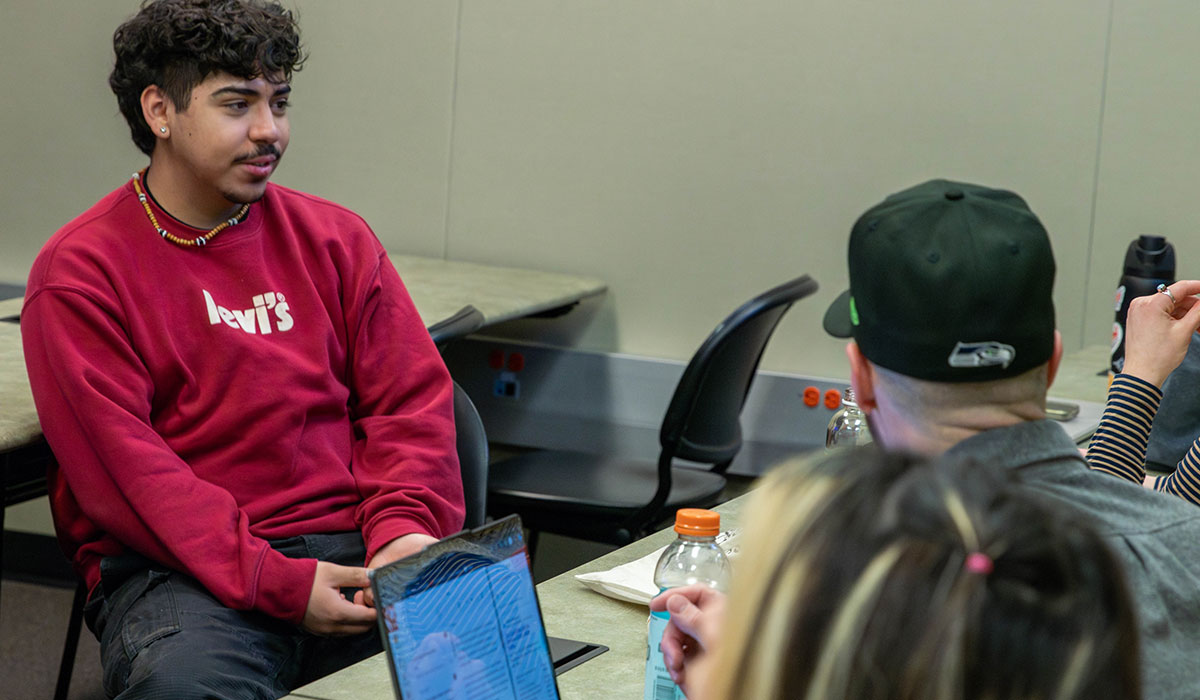After Jaren Wallulatum graduated from high school in 2014 he enrolled at a college in his home state of Oregon, uncertain what career path to pursue. And like many first-generation students, he wasn’t sure where to go for support as he started his college experience.
“For myself, it was difficult being new to higher education,” he said. “I didn’t know where to look for the resources I needed to succeed.”
Wallulatum would transfer to another college before leaving school to enter the workforce and moving to Washington. Two years later, Wallulatum gave college another try — only this time with the support he had earlier lacked.
That helping hand came from Yakima Valley College’s TRIO Student Support Services, a federally-funded program that provides low-income and first-generation students with academic support services such as tutoring, assistance with education plans, personal and career counseling, book loans and more.
“Finding TRIO made a huge difference for me in navigating the higher education system,” said Wallulatum, who graduated from YVC in 2019 and is now majoring in economics and public policy at Central Washington University. “It helped build a network of peers, instructors and college staff who I can reach out to for help.”
Over the next five years, hundreds of YVC students like Wallulatum will benefit from access to additional financial support, mentoring, tutoring services and academic advising thanks to a recent $1.8 million grant from the U.S. Department of Education that will extend the college’s TRIO program.
TRIO helps YVC students overcome class, social and cultural barriers to higher education said Dustin Shattuck, director of the program. And in taking down those barriers, TRIO ultimately helps increase students’ academic success, graduation rates and likelihood of transferring to four-year institutions.
“TRIO works because it serves a population — first-generation, low-income students — who don’t usually know how to navigate college,” Shattuck said. “A lot of these students have been through a lot of adversity, but when they have access to some of these resources to succeed, you really see them blossom.”
In each of the next five years, 200 students will be supported through YVC’s TRIO program, with individual students being served from one to three years depending on their academic pathway.
While financial aid programs help students overcome financial barriers to accessing higher education, Shattuck said TRIO’s services focus on empowering students to succeed in their educational journeys. For example, students participate in a learning community from the beginning of their time at YVC in order to build networks of peer support. They also have coursework supplemented with advising and mentoring aligned with their career goals, and the college offers workshops and field trips on financial literacy, financial aid and scholarship applications, career and worksite awareness, cultural awareness and planning for transfer.
“Our program focuses on engaging with students around their career intentions and the bridge that education plays in attaining these careers,” Shattuck said.
At the end of Wallulatum’s first year at YVC, he and handful of other students in the program were approached by their advisor about starting a peer mentoring and leadership program.
“That was an experience that really helped build our leadership and professional skills because we were in charge of planning a lot of activities for our peers and their growth,” he said. Following that leadership experience, Wallulatum would go on to serve as YVC Student Council president.
Wallulatum is scheduled to complete his bachelor’s degree in 2022 and then enter CWU’s graduate program in cultural and environmental resources management. Wallulatum, who grew up on Warm Springs Indian Reservation, is interested in studying how his tribe and other tribes can maximize the resources on reservations for the benefit of those living on them.
“TRIO helps inspire students to continue to go further in education and in their careers,” Wallulatum said. “Those connections you make are life and career connections you can continue to reach out to. There are still friends I made who I talk to on a daily basis and I know that I can reach out to them anytime for assistance and I know that I can reach out to the faculty anytime in the future.”
For more information visit YVC’s TRIO Student Support Services website.
